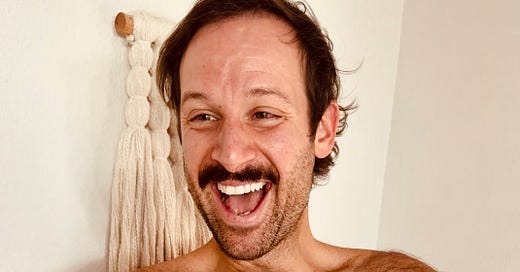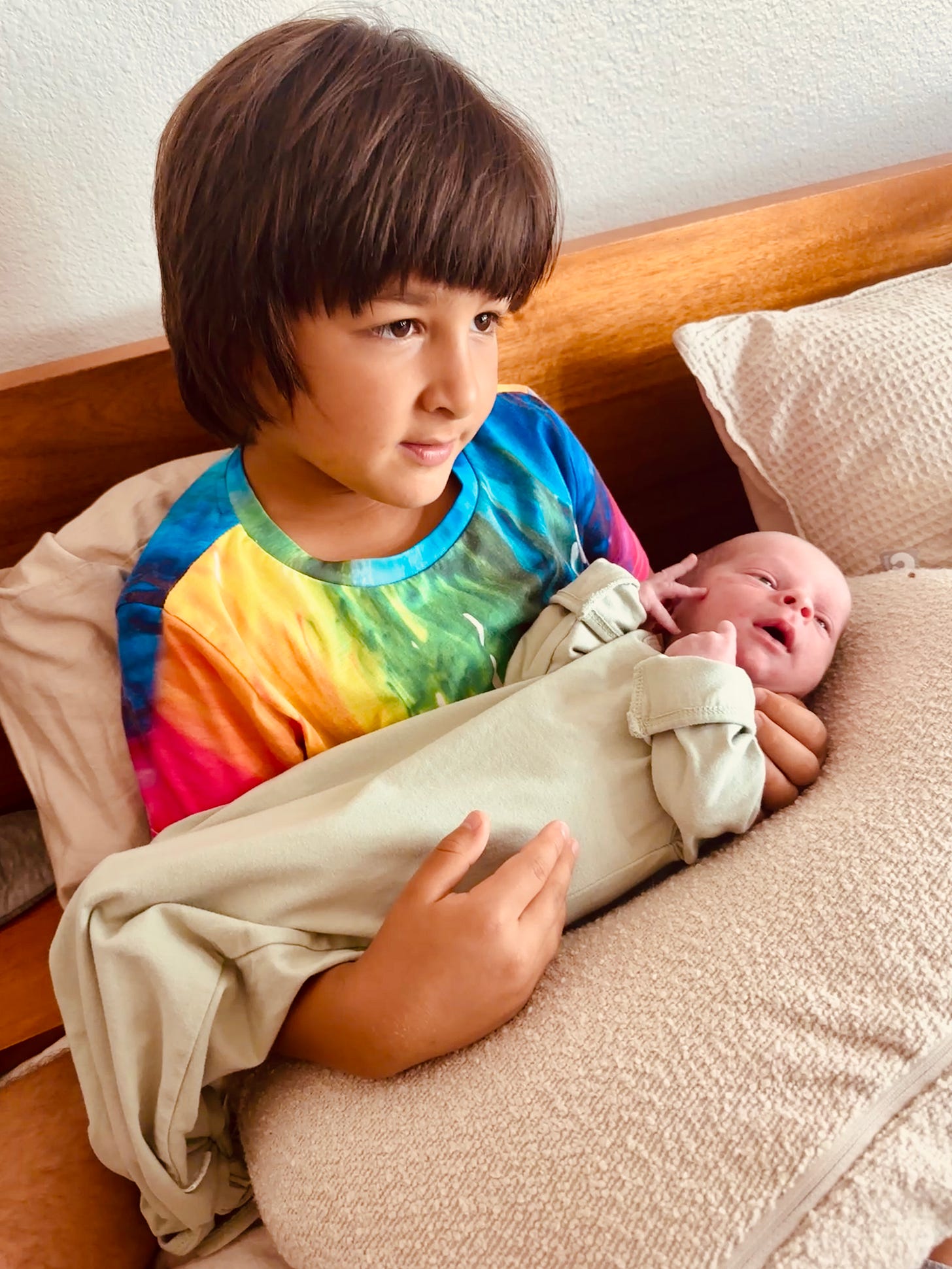6 Things I Wish I Knew Before Becoming a Dad
What do you now know about being a good dad that you wish you knew when you were just starting out? Here are some of my answers.
One of my favorite questions for dads has always been:
What do you now know about being a good dad that you wish you knew when you were just starting out?
As I was going on a run this morning, I thought about how I would answer that question. The things below flowed out of me, and in honor of Father’s Day, I thought I would share them with all of you. Enjoy.
Some are deep, some are practical, but all of them made a significant difference in my ability to show up as the kind of dad I want to be.
1. The most important thing you can do to support your kid is love their mother
Arthur Brooks has been echoing this one on the podcast circuit recently:
This isn’t just a nice thought. It’s backed by decades of research showing that children thrive when they witness strong, supportive relationships between their parents. That love can be romantic or familial—what matters most is that it’s intentional, respectful, and expressed… that they see it and feel it.
Whether it was with Miki and Hiro, or now with Ever and Mel, I’ve learned that if I commit to loving and supporting their mother fully, that action alone becomes one of the most meaningful things I can do for their emotional well-being. Children who feel the safety of that love witness what it looks and feels like to live life well and lead a family with heart.
A few of my favorite things to make this easier; The check in, Objective communication, and asking whether she wants to be “held, heard or helped” during conflict.
2. Rituals are everything
We are not what we do. We are what we do consistently.
Rituals make sure that I am not using busyness as an excuse for the things that matter to me as a dad.
One of the realizations I had when I separated from Miki was that while I have less time with Hiro, I can make a conscious decision to cultivate as much quality time. I believe that this is what matters most. It's not the quantity of time, it is the quality of time. I'm intentional about those moments that I think he'll remember when he grows up, most of those stem from our rituals.
Here are a few of my favorite rituals that I have built up over the years:
“Bedtime ritual”
Each night before bed, Hiro and I follow the same rhythm. We sing a song. He gets to ask me a question. And then we say our mantra:
“I am loved. I am supported. I am perfect exactly as I am.”
Over time we added:
“We are safe, we are awesome, and anything is possible. We are responsible, respectful, and we are grateful.”
These words shape his belief system—his relationship to himself and the world. Being intentional about the beliefs we give our kids is one of the most powerful gifts we can give our kids. Shoutout to Bryan Franklin for this insight!
“Daddy and Hiro time”
This is not just hanging out, this is “Daddy and Hiro time”... big difference. This is intentional playtime where I give Hiro my full attention. There is something powerful about explicitly setting the container that helps me to unplug, get off my phone, and be fully present.
There are a few ground rules: nothing dangerous, no money exchanged, no sugar. Other than that, he picks what we do. I’m all in. It’s often short, but the quality is everything.
I try to do this for at least 15 minutes a day before bedtime.
“Daddy and Hiro trip”
Once a year we have a ski trip that is just for me and him. We've done this three years in a row now, and I'm excited to do it for the rest of our lives. An annual trip like this has become one of the most sacred and fun things in our relationship.
“Daddy and Hiro dates”
Once a month, we carve out a day for just us. It’s not about doing something crazy or big. It’s about him knowing that this time is sacred and just for us, often influenced by what he most wants to do. It’s something different than just going out together—it has a deeper level of intention and excitement infused into it. It’s something to look forward to.
3. Excess/unintentional screen time is cruel
I grew up on Gameboys and Nintendo 64, but the digital environment our kids face today is a different beast. Streaming services and multiplayer-connected games are so addictive that it is vital to get these agreements right from the start. Once the genie is out of the bag, it’s hard to put him back in.
We’ve been very intentional with Hiro from day one. Here’s what’s worked for us:
Foreign language only shows: From the beginning, Hiro was only allowed to watch shows in Spanish. It became a powerful forcing function—he wanted screen time more than food, and as a result, became fluent quickly.
No fast forwarding or rewinding: When kids can skip scenes, they train their brains to constantly chase novelty. Our rule: no skipping. If you do, screen time goes away.
Weekend screen time: I loved movies and video games growing up, and I don't want to completely take away these things that he really enjoys. I just wanted to do it in an intentional way. I think it is healthier to build up some level of agency with these things than to eliminate them altogether. He can pick one day each weekend for games and one for movies. This way, it’s not an everyday thing. It’s a choice with structure.
Educational games only: We review every game he plays. CodeSpark, chess, puzzles—games that build skills. No Minecraft survival mode. No Roblox. Over time, we have started to let him play some games that we love whenever he wants. Things like Simply Piano, Simply Draw, and Chess he can have whenever he wants. He can also read books on the iPad as much as he wants. This is a nice middle ground as he is doing things he wants on the iPad that are in his best interest and growth.
Travel time: Unplanned screen time is for planes, long car rides, and communal dinners out only. That’s it. I think that this rule was really important for us because it allowed me to maintain some of the social activities that were really important for my own well-being. Happy parents, happy kids.
4. Be firm and loving
Holding boundaries through our child’s emotional storms is not easy, but it is one of the greatest gifts you can give them.
If they cry, scream, argue, or resist—and you lovingly stay grounded—you are teaching them clarity. You are showing them what is acceptable and what is not.
And just as important, you are showing them that their feelings are welcome. That your love does not waver.
Over time, they stop trying to test the boundary every time. They know it’s real. They trust you. They feel safe. And the connection deepens.
Dr. Aliza Pressman has a great quote about this:
“All feelings are allowed, all behaviors are not.”
I believe this blend of high warmth and high boundaries is the model that produces the most emotionally resilient children.
Boundaries are not about control. They are about teaching, structure, and loving our kids. Getting them out of the doom spiral of wondering whether a tantrum is going to get them what they want.
One of the best ways that I express this archetype is by sharing the words, "I am not going to repeat myself." If Hiro and I disagree about something, I will hear him out. Mirror what he says to make sure that he has been heard. Explain my position. And ask him to repeat what I have said once both parties have been heard. I'm not going to repeat myself or negotiate with him. I will be with him in his feelings, but I am clear that we're not negotiating.
5. Remembering early oneness as a newborn dad
This one is especially relevant for me as Ever is nearly one month old. One of my favorites to gift new dads.
One of the most profound things I learned is that in the first three months of life, a child essentially has no sense of self.
The part of their brain that regulates ego is not yet developed. They experience the world as one unified field.
There is no separation between them and you. Or the fan. Or the wall. Or the light.
They are oneness.
So when I’m with Ever, I ask myself:
If we were one being, what energy would I want to bring forward right now?
That question grounds me in presence and a different kind of love that I hope to imprint on his little being in some way.
6. Don’t make your kids like you, make them like them.
I am really clear that as a parent, I don't want Hiro to be like me. I want to stay curious and create the space for him to become the fullest expression of his authentic self.
Instead of projecting my interests onto Hiro, I try to offer him structure and choice.
For instance, we ask that he participates in at least three physical activities a week. He gets to choose from nature camp, jiu-jitsu, gymnastics, hockey, basketball—literally anything he wants.
Same with music. We want him to learn music as a second language—but he picks the songs. The agency is his. The structure is ours.
That’s the balance.
We listen to music every morning in the car. I get one of my songs and then he gets one of his, which is often some sort of 8-bit garbage about Minecraft. But I will lovingly rock out to it with him.
A final note on this from Khalil Gibran:
Your children are not your children.
They are the sons and daughters of Life’s longing for itself.
They come through you but not from you,
And though they are with you, yet they belong not to you.
You may give them your love but not your thoughts,
For they have their own thoughts.
You may house their bodies but not their souls,
For their souls dwell in the house of tomorrow,
which you cannot visit, not even in your dreams.
You are the bows from which your children as living arrows are sent forth.
Big love to all the dads and father figures out there today and all day.
and most importantly, thanks to Hiro and Ever for making me a Dad.
I love you,
Hairy guy with mustache







💜